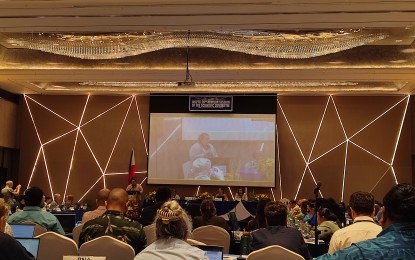
TUNA INDUSTRY. The Department of Agriculture- Bureau of Fisheries and Aquatic Resources (DA-BFAR) hosts the 20th Regular Session of the Scientific Committee of the Western and Central Pacific Fisheries Commission (WCPFC) in Quezon City on Wednesday (August 14, 2024). During the session, the BFAR highlighted the importance of scientific discussions in boosting the country's tuna industry. (PNA photo by Stephanie Sevillano)
MANILA – The Department of Agriculture (DA) on Wednesday highlighted the significance of scientific discussions in boosting tuna production as the country hosts the Western and Central Pacific Fisheries Commission (WCPFC) 20th Regular Session of the Scientific Committee.
The eight-day meeting, participated by international scientific experts, policymakers, and various industry representatives, intends to discuss scientific information for fisheries management and sustainable practices for protecting marine resources in the Western and Central Pacific Ocean (WCPO).
In a press conference, DA Undersecretary for Fisheries Drusila Esther Bayate said the target agenda is “crucial” for the country's tuna industry considering the administration's food security goals.
“The tuna fishery is a major driver of the economy. Last year, we produced around 409,000 metric tons (MT) of various species of tuna, valued at PHP51 billion,” she said.
“As a responsible flag state, we are also privileged to have access in the Western and Central Pacific. And of course, we need to be compliant with the conservation management measures to continue and give our share, contribute our share in preserving and protecting the stocks,” Bayate said.
In a separate speech, Bayate said that more than half of the global tuna catch is caught from the WCPO.
The official, however, stressed the need to include mitigation measures against climate change in the discussions, considering impacts of the El Niño phenomenon and the looming La Niña in the fishery sector.
“Climate change presents significant challenges to our fisheries, affecting the distribution and abundance of fish stocks. This is a pressing issue for the Philippines, and we are eager to engage in discussions on how to address these challenges,” she said.
The Philippines remains one of the key players in the tuna industry, being the 6th highest tuna producer in the WCPO in 2023.
With the improved catch rates of Philippine-flagged vessels, the country produced 159,555 MT of tuna catch last year, which is eight percent higher than 2022’s 147,488 MT catch, according to the BFAR.
Overall, the Philippines’ tuna catch in 2023 is equivalent to seven percent of the total global tuna catch. (PNA)
